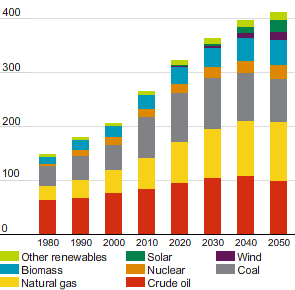PROJECTED GLOBAL ENERGY DEMAND TO 2050 million barrels of oil equivalent a day

Source: Shell analysis, November 2012
The world’s population is heading for more than 9 billion by 2050, from today’s 7 billion. Global energy demand is rising, yet in many regions easy-to-reach supplies of oil and natural gas are becoming harder to find. To help meet growing demand, more renewable energy as well as more fossil fuels will be needed. According to Shell’s scenarios, energy from solar, wind, hydro-electricity and biomass could rise to around 30% by 2050, with strong government support. Nuclear power will also continue to play a part. Fossil fuels are expected to meet around 65% of energy demand by mid-century. At the same time, carbon dioxide (CO2) emissions must be cut significantly if the planet is to avoid the most serious effects of global warming and climate change.
Vital resources under pressure
Energy production is linked to both water use and food production. If the world is to build a sustainable energy future, these three elements must be carefully managed to avoid growing stresses, which are expected to increase with climate change. In 2012, we published findings from our work with the World Business Council for Sustainable Development and the University of Utrecht, in the Netherlands, to develop a new way of assessing more accurately the amount of water that energy production needs. We are sharing our data with the wider business community and the International Energy Agency (IEA), and have incorporated it into our own scenarios modelling.
Governments, business and civil society must work together to overcome the challenges of climate change and the energy-water-food stresses. We are encouraging this collaboration. In 2012, for example, we brought together CEOs of multinational companies from several industries to identify joint projects that could help to start tackling resource stresses. Shell is already working to reduce the amount of water we use. For example, a recycling plant makes our gas-to-liquids facility in Qatar self-sufficient in water, avoiding the need to draw on scarce fresh-water resources.
Rapid urbanisation
By 2050, around 75% of people will be living in cities, up from 50% today. As urban population density grows, cities and towns will suffer most from increasing pressure on resources. This creates an opportunity to build more efficient and integrated systems, including better transport networks. But closer co-operation is needed between urban planners, local governments and companies to find innovative ways to move more people and goods safely, cost effectively and with less environmental impact.
We are working with governments and authorities in major cities on several continents to better understand how cities develop, and their impact on energy supply and demand. In China, for example, we have worked for two years with the state-run Development Research Centre to help analyse and improve the country’s mid- to long-term energy strategy. In 2012, we also began working with Singapore’s Centre for Liveable Cities with a view to improving city management in the future.
Acting now for the future
The IEA says that unless governments change policy, the world faces an insecure, inefficient and high-carbon energy future. Without clear measures to promote investment in more efficient and low-carbon technologies, it risks setting itself on a course to potentially catastrophic climate change.
At Shell we advocate publicly and to governments that a strong and stable price on CO2 emissions will help drive the right investments in low-carbon technologies. But we are not waiting for government policy to develop. We consider the potential cost of a project’s CO2 emissions, which we set at $40 a tonne, in all our major investment decisions. We are producing more natural gas, the cleanest-burning fossil fuel, and we produce low-carbon biofuel. We are also helping to develop carbon capture and storage technologies, and working to improve the energy efficiency of our operations.
Opinion

Shell uses scenarios to peer into the future as an aid to strategic planning. Major corporate actors like Shell will be critical in shaping a future of resilience. Shell has incorporated the Planetary Boundaries concept – meaning that pursuing some of our activities beyond certain limits increases the risk of large-scale changes in the way the entire earth system behaves – into its scenarios work. Helping Shell with this process has given me hope that making the transition from an oil and gas company to a sustainable energy company will not be an impossible endeavour. Difficult, certainly. Impossible, definitely not.”
Professor Kevin Noone
Director of the Swedish Secretariat for Environmental Earth System Sciences, Stockholm, Sweden



